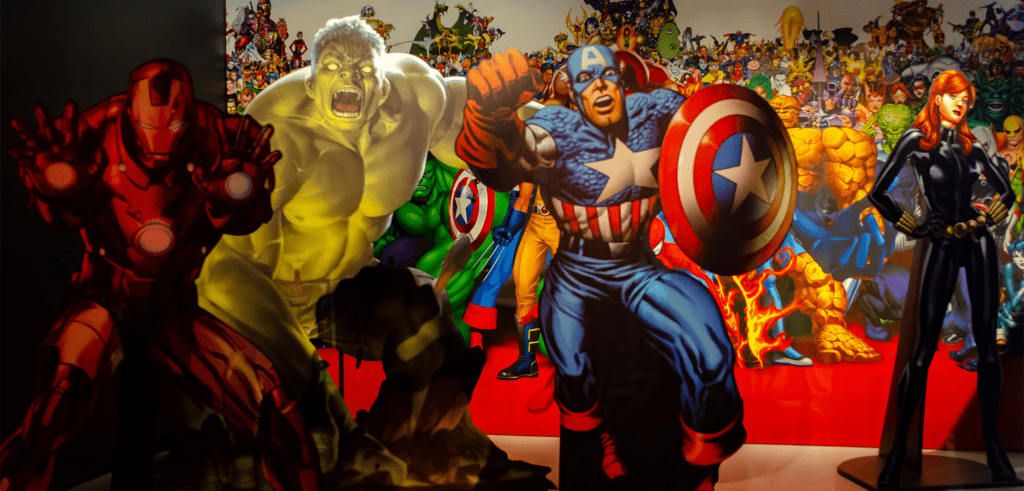
Jonathan R. Goodman—
Recently, I ran my daily Google search about my upcoming book, Invisible Rivals, expecting the pages I’ve seen about it before. But this time there was something new: information about a Marvel Universe character, Invisible Woman, had started infiltrating my keywords. This is because, I found out, a recent video game called Marvel Rivals had just started including Invisible Woman as a playable character.
Probably because I’ve always found the Marvel Universe a bit silly, this annoyed me. But then I realized something interesting about this coincidence, and about the idea of the Invisible Woman more generally: being undetectable is something people find intriguing. In almost every culture there is a story of someone with the power to become invisible—from the concept of Brahman in Hinduism, which explores the invisibility of reality, to the Ring of Gyges in Plato, which grants its wearer the power to become unseen (think also of the One Ring in Tolkien’s work).
Yet a nuance that I can guess, without playing the video game, that the writers of that content do not explore is how invisibility intertwines with self-corruption. For example, in Plato’s allegory of Gyges, a shepherd who finds a ring granting invisibility eventually commits murder and makes himself a king. One lesson from the story—written into Plato’s Republic—is that the power to make yourself undetectable necessarily lends itself to moral corruption. If only you can keep yourself from committing crimes and hurting others, what is there to stop you but your own moral code? And can we expect that anyone’s moral code would be maintained in these circumstances?
There is no reason to think it’s impossible that the ring’s wearer should be corruptible, but it seems unrealistic to assume that someone apparently good would necessarily maintain that goodness in the absence of any price for behaving badly. That simplicity seems to be built into fictionalized universes, like Marvel’s, more broadly. There is good and there is evil; there are corruptible villains and incorruptible heroes—and the history of the universe is the story of the struggle between the two.
We might be able to dismiss this easily if a similar dichotomy weren’t applied to human nature more generally, even in academic writing. A lot of researchers—from the time of Charles Darwin and even long before—aim to place humans into a broad box of the heroic or the villainous. Some want to prove that, like the valiant Avengers in the Marvel movies, we will find a way to fight the bad guys and do the right thing for humanity. Others think we just can’t overcome our innate selfishness and are consequently more like the bad guys we like to watch being beat up.
One reason that I think the Amazon show The Boys has been so popular is its rejection of the first of those views. In that show, people with superpowers are almost all unsympathetic villains who want to convince others they are heroic even as they live in a hedonistic and murderous environment. The character who can become invisible, for example, is a pervert who hides in women’s bathrooms. (I should add that this is not a show I recommend—its grotesqueness outweighs the more believable depiction of how real superheroes probably would behave.)
My own sympathies are closer to the depiction of how power corrupts in The Boys. Being good or bad isn’t a state of humanity but rather depends on the circumstance, such as whether we have an opportunity to steal without being caught. That kind of complexity, it seems, is beyond the writers of Marvel films to capture, and so the stories dumb down the qualities that make human nature worth studying. Goodness and evil are phantoms that we invent to make our evenings more entertaining and the complexity of our struggles easier to endure—in reality, it is those same struggles, whether personal, professional, or political, and how we react to those struggles, that determine our moral qualities.
There’s no reason for content from the Marvel universe to ignore these complexities, and I’d probably be a lot less annoyed at sharing search terms with entertainment that tells us something interesting about ourselves. In fact, Andor, a Star Wars–derived TV show, is a fantastic example of this. But that’s not something I expect much of from the entertainment industry—or, to be honest, from a lot of writers interested in human nature. So the next time you are confronted with an unrealistically simplistic portrayal of how people behave, ask what you are getting out of it—and what those portrayals miss.
Jonathan R. Goodman is a social scientist based at the Wellcome Sanger Institute and Cambridge Public Health, University of Cambridge. He writes about trust, inequality, and evolutionary theory for publications including the Financial Times, New Scientist, Nature, The Guardian, and Scientific American. He lives in London, UK.







